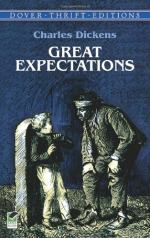The weather was miserably raw, and the two cursed the cold. It made us all lethargic before we had gone far, and when we had left the Half-way House behind, we habitually dozed and shivered and were silent. I dozed off, myself, in considering the question whether I ought to restore a couple of pounds sterling to this creature before losing sight of him, and how it could best be done. In the act of dipping forward as if I were going to bathe among the horses, I woke in a fright and took the question up again.
But I must have lost it longer than I had thought, since, although I could recognize nothing in the darkness and the fitful lights and shadows of our lamps, I traced marsh country in the cold damp wind that blew at us. Cowering forward for warmth and to make me a screen against the wind, the convicts were closer to me than before. They very first words I heard them interchange as I became conscious were the words of my own thought, “Two One Pound notes.”
“How did he get ’em?” said the convict I had never seen.
“How should I know?” returned the other. “He had ’em stowed away somehows. Giv him by friends, I expect.”
“I wish,” said the other, with a bitter curse upon the cold, “that I had ’em here.”
“Two one pound notes, or friends?”
“Two one pound notes. I’d sell all the friends I ever had, for one, and think it a blessed good bargain. Well? So he says — ?”
“So he says,” resumed the convict I had recognized — “it was all said and done in half a minute, behind a pile of timber in the Dockyard — ‘You’re a-going to be discharged?’ Yes, I was. Would I find out that boy that had fed him and kep his secret, and give him them two one pound notes? Yes, I would. And I did.”
“More fool you,” growled the other. “I’d have spent ’em on a Man, in wittles and drink. He must have been a green one. Mean to say he knowed nothing of you?”
“Not a ha’porth. Different gangs and different ships. He was tried again for prison breaking, and got made a Lifer.”
“And was that — Honour! — the only time you worked out, in this part of the country?”
“The only time.”
“What might have been your opinion of the place?”
“A most beastly place. Mudbank, mist, swamp, and work; work, swamp, mist, and mudbank.”
They both execrated the place in very strong language, and gradually growled themselves out, and had nothing left to say.
After overhearing this dialogue, I should assuredly have got down and been left in the solitude and darkness of the highway, but for feeling certain that the man had no suspicion of my identity. Indeed, I was not only so changed in the course of nature, but so differently dressed and so differently circumstanced, that it was not at all likely he could have known me without accidental help. Still, the coincidence of our being together on the coach, was sufficiently




